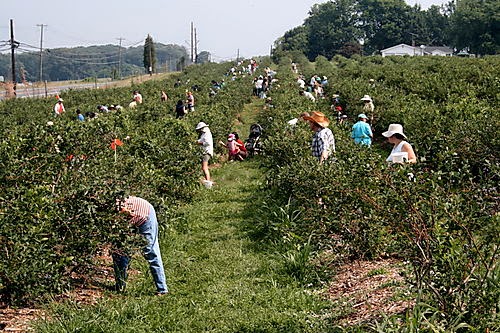Lee and I are serious berry pickers.
We don’t talk much to each other during our time in the field. Instead, we focus on finding only the best, ripest berries and filling our buckets.
But apparently, for a lot of folks, picking berries is the preferred way to socialize with family and friends.
Since we’re not talking, we easily hear the conversations of those in close proximity.
Being the observer of people I am, I can’t help but notice the differences in the types of exchanges that take place, especially between adults and the children with them.
And I once again marvel at the opportunities adults have for positive influencing (or not) the young people in their charge.
Here are some exchanges that stood out for me…and why. (Note: Ages cited for children are best guesses, not verified).
Most ENDEARING (Mother and 5-year old Daughter)
Daughter: Mommy, here are some berries I picked. You can put them in your bucket.
Mother: Why thank you, honey. That’s very kind of you to share with me.
Daughter: Of course! You’re my mommy, and I love you.
My take: Children don’t naturally become sensitive to the needs of others. It takes effort on the part of their parents to help them become less self-centered. This brief exchange, along with other comments they shared, illustrated that this mother has invested time teaching her daughter to be thoughtful and considerate.
Most ANNOYING (Grandmother with 8 year-old Girl and 10-year old Boy)
Boy: It’s getting too hot out here, Grandma. (actual temperature: low 80s)
Girl: Yeah, I’m starting to get all sweaty.
Grandmother: It’s not fun when you got hot and sweaty. Would you like to quit now?
My take: I wanted to jump through the bushes and shake this woman when I heard her reply to these two whiners. It was a beautiful, sunny day – perfect for being outdoors. Instead of encouraging the kids to enjoy their time outside or assuring them that sweat is the body’s natural response or any other comment that would have communicated they had no basis for complaining, she sympathized with them. Her response did nothing to help these children develop mental and physical toughness.
Most HUMOROUS (Man at edge of field and Grandfather in middle of field)
Man: Is there a Grandpa King out there somewhere?
Grandfather: Yes, here I am!
Man: Great, I’ve got your grandson with me. He couldn’t find you.
Grandfather: Good luck to you! (everyone in the entire field laughs in unison)
My take: Later at the barn when we were paying for our berries, we saw the grandfather with his wife and grandson. Their interactions showed that he had probably only been half-joking with his earlier response. He didn’t seem to be enjoying his time with the boy. No matter what the grandson said or did, the man had a critical comeback. While I know children can try your patience, you can always find something to praise and affirm if you’re paying attention.
As adults, we’ve established closely-held beliefs about who we are and what we’re capable of. What we heard about ourselves as children from those whose approval means most to us – such as parents and grandparents – goes a long way to shaping the way we see ourselves.
No matter what role you have in the lives of the young people you interact with, you have the power with your words to enrich or diminish their self-image and the way they view the world.
And come to think of it, you also wield that same influence with everyone you interact with, no matter what their age.
“Treat a child as though he already is the person he’s capable of becoming.”
- Haim Ginott, child psychologist, 1922-1973)






Great good for thought, Meredith. This reminds me of my childhood and a poster that my mother hung on the side of our refrigerator:
ReplyDelete"Children Learn What They Live
By Dorothy Law Nolte, Ph.D.
If children live with criticism, they learn to condemn.
If children live with hostility, they learn to fight.
If children live with fear, they learn to be apprehensive.
If children live with pity, they learn to feel sorry for themselves.
If children live with ridicule, they learn to feel shy.
If children live with jealousy, they learn to feel envy.
If children live with shame, they learn to feel guilty.
If children live with encouragement, they learn confidence.
If children live with tolerance, they learn patience.
If children live with praise, they learn appreciation.
If children live with acceptance, they learn to love.
If children live with approval, they learn to like themselves.
If children live with recognition, they learn it is good to have a goal.
If children live with sharing, they learn generosity.
If children live with honesty, they learn truthfulness.
If children live with fairness, they learn justice.
If children live with kindness and consideration, they learn respect.
If children live with security, they learn to have faith in themselves and in those about them.
If children live with friendliness, they learn the world is a nice place in which to live."
This comment has been removed by the author.
ReplyDeleteSteve, your mother was very wise. I have read that before but it's been years. And it's perfectly tied to the points I was making here. Thank you for sharing!
ReplyDelete